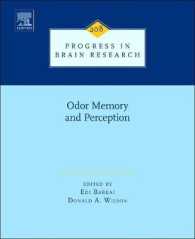- ホーム
- > 洋書
- > ドイツ書
- > Social Sciences, Jurisprudence & Economy
- > Jurisprudence & Law
- > general surveys & lexicons
Full Description
One of the main goals of this book is to determine if, in the works of some of the key authors in the history of Italian political philosophy, a notion of "efficacy" can be found. In legal philosophy, "efficacy" is the capacity a norm has to effectively influence citizens' behavior. The "principle of efficacy" is that according to which an order or rule exists as such when it is followed effectively in practice. Here by "efficacy" I mean the idea that normative phenomena are self-justifying, without reference to extrinsic systems of value (such as "natural law"). The examinations of several texts undertaken here constitute reflections on this theme, without any claim to systematicity. They have been grouped together, roughly in historical order, by their common respect for the contexts within which they reason and reach decisions, which lends them a characteristic flavor of harsh realism that at times relies on a minimalist use of traditional normative categories.
The second theme that emerges through the respective chapters (each of which constitutes the text for a lesson in a course for Ph.D. students) is that of the relationship between "equality" and "vulnerability." Here the idea is to elaborate a concept of "vulnerability" that is not underpinned by what we in Italy call an "anthropology," that is, a fixed notion of human nature. Instead this concept should be comprehensible and graspable solely on the basis of the recognition of decisions and actions that are merely "efficacious," that function "for what they are, and what they do." This recognition doesn't even need to be explicitly articulated by these authors with any specific, deliberately conscious awareness.
The goal is not to identify a precise tradition of thought, one which elaborates a given line of reflection, but rather to highlight certain "themes" that emerge in the texts examined, even as the authors write with and for their own specific,contingent set of motives, which differ from time to time and place to place. These authors include some who are widely known, such as Dante, Machiavelli, and Beccaria. At times they are figures who typify certain key historical episodes, such as the Risorgimento (Giuseppe Mazzini) or Fascism (Cesare Lombroso and Santi Romano), while others reflect certain aspects of a contemporary debate (Pasolini and the "Braibanti affair").
The book is based on lectures given for a 2021 Ph.D. Course at the University of California, Berkeley's Department of Italian Studies.
Contents
Introduction: Teaching Under Unusal Circumstances.- Dante Alighieri, Hans Kelsen, and the Principium Unitatis.- Niccolò Machiavelli and Efficacy.- Gerolamo Cardano and Italian "Realism".- Efficacy in the Italian Tradition: from Giovanni Della Casa to Giovanni Nevizzano.- Paradoxes of Equality: Giambattista Vico.- Cesare Beccaria and the Narrative of Neutral Equality.- Equality and Vulnerability in The Duties of Man: Giuseppe Mazzini.- Social Pluralism, Efficacy & Equality - Rethinking The Legal Order by Santi Romano.- From Emilio Salgari to Cesare Lombroso - Racism and Law in Italy: Situated Vulnerability.- The Limits of Law and Arturo Carlo Jemolo's Islands.- The Italian "Braibanti Affaire": a Tale of Two Vulnerabilities.- We, the People: Of Poets and Priests. Pasolini's Very Hard Poem.







